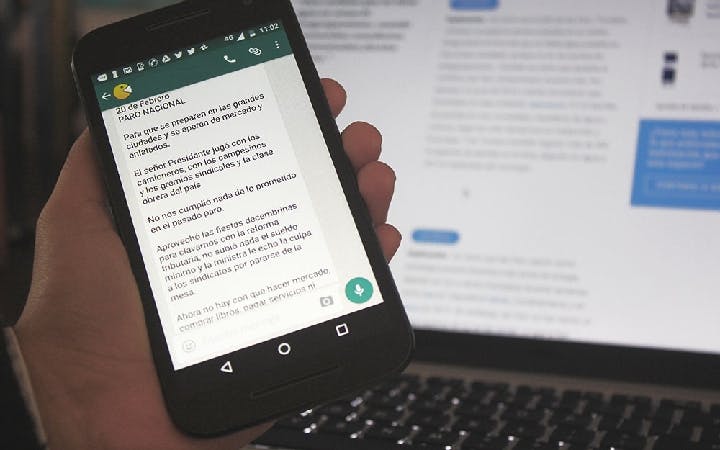Winter 2018
In Colombia, a WhatsApp Campaign against *Posverdad*
– Pablo Medina Uribe
Tendrils of disinformation, extending through a popular social media platform, impacted one of the most crucial votes in Colombia’s history. In response, one news organization decided to fight disinformation by appropriating the same app that spread it.
In 2016, the world was introduced to the term “fake news” and the phenomenon of the “post-truth” era — or, as we in the Spanish-speaking world call it, posverdad. Commentators used these terms to try to explain how repeated lies and half-truths, amplified by the social media echo-chamber and the inundation of the 24-hour news cycle, helped to create unlikely political developments, such as the British electorate’s voting to leave the European Union and the victory of Donald Trump in the U.S. presidential election.
However, one of the most glaring examples of how misinformation was deployed to achieve political ends comes not from Europe or North America, but Colombia. In the fall of 2016, a prominent politician admitted to deliberately misleading the public ahead of one of the most important votes in the country’s history. In doing so, he confirmed what many citizens already knew: WhatsApp, a digital communication platform on which we now spend much of our lives, is fertile ground for group manipulation. And, as serious news outlets and journalists in Europe and the United States turned their attention to reinforcing their societies’ fourth pillar – and grappling with the challenges of social media in doing so – an outlet in Colombia was spurred to do the same. Its approach: use WhatsApp to help keep WhatsApp in check.
A Stunning Result
On October 2, 2016, Colombians and observers around the world were stunned. The government had organized a plebiscite with a simple question: Do you approve of the peace deal agreed to between the national government and the Revolutionary Armed Forces of Colombia (FARC)? The accord was poised to end the longest-running conflict in the world, a five-decades-old confrontation that spawned other left-wing guerrillas, right-wing paramilitary groups, and state-sponsored violence. The scars left on Colombian society begin with at least 220,000 people killed and nearly 6 million displaced.
Most polls in the country indicated that the deal would be approved. The international press was filled with laudatory pieces praising the work of Colombian President Juan Manuel Santos and his negotiating team as well as articles highlighting the country’s turnaround from a near-failed state to a symbol of reconciliation and hope.
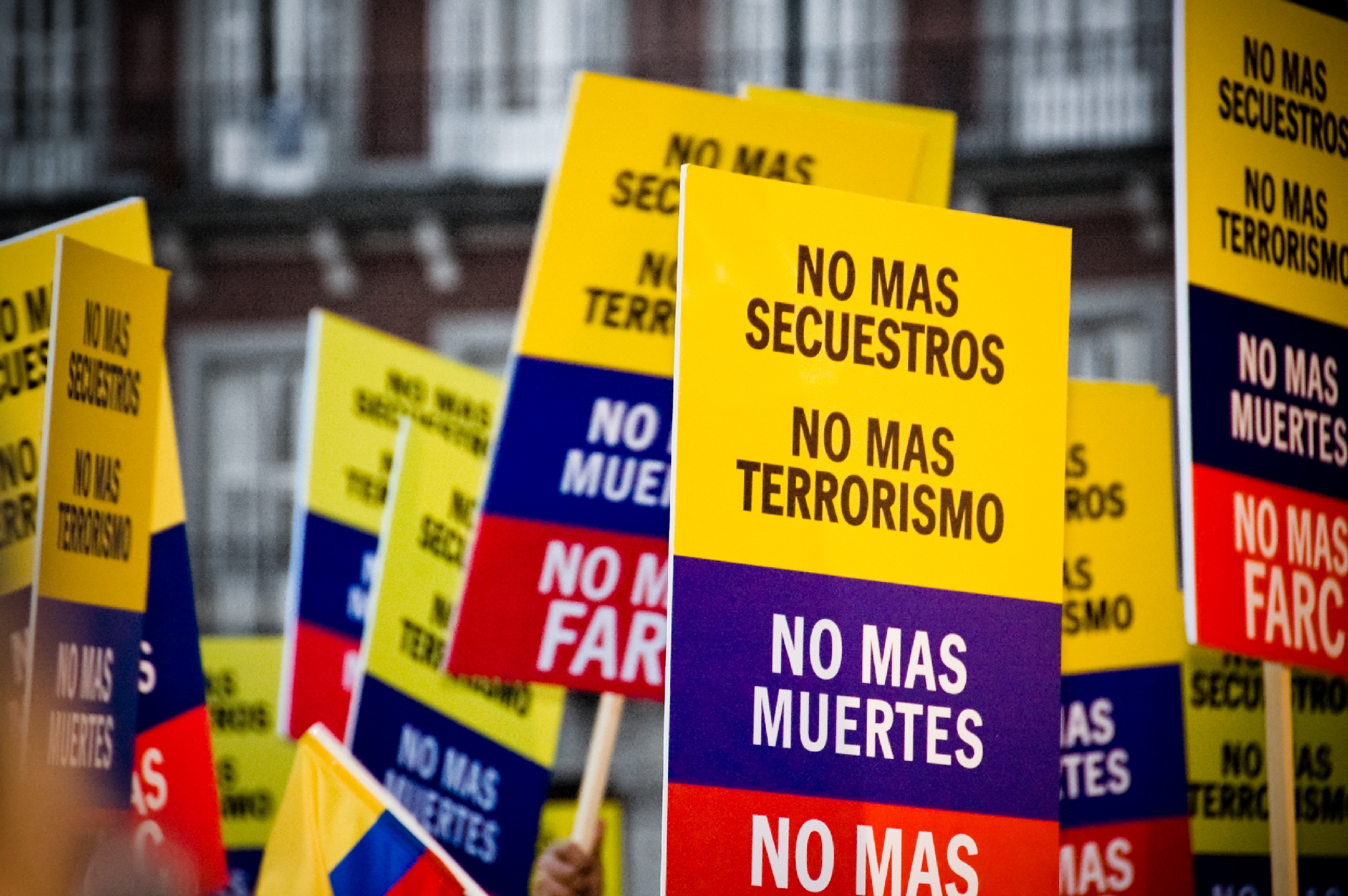
Then, Colombians voted “no” – by a margin of less than one-half of one percent.
Opposition to the referendum was spearheaded by Centro Democrático, a party led by former President and current Senator Álvaro Uribe, and made up of many staunch Uribe loyalists. The party campaigned against the peace deal by arguing that it would unjustly allow guerrillas who had committed crimes to walk freely back into civilian life. But there was political infighting going on as well. During his first presidential campaign in 2002, Uribe rose to prominence in large part by vowing to defeat FARC on the battlefield. Later, as President Santos adopted more liberal policies, he found a clear political enemy in Uribe. Since then, Uribe has positioned himself, and his party, as the main opposition to the Santos administration.
Two days after the vote, with the collective jaw of the country still very much in a dropped position, La República, a small economic newspaper in Bogotá, interviewed Juan Carlos Vélez, a member of Centro Democrático and the manager of the “no” campaign. The campaign had been “the cheapest and most effective in history,” Vélez bragged.
What followed in the interview, however, would cause widespread outrage: When asked what the campaign’s message was, Vélez said it was “indignation,” to ensure that people “went out to vote angry.” And the strategy? “We discovered the viral power of social networks,” he said. His interviewer then directly asked why the campaign had “distorted messages.” Vélez’s admission came in the form of “The ‘yes’ camp did the same.”
Chávez and Sexual Orientation
Vélez only superficially mentioned a few of these distortions. However, one was among the most widespread lies in circulation – that the peace deal would reduce pension payments for Colombian citizens in order to finance the demobilized guerrillas. Indeed, the accord included provisions to pay for the rebels’ reintegration into society, but pensions weren't considered as a source of the funds.
Many other misleading messages shared on social media were centered around so-called “castrochavismo.” The term, coined by the “no” camp (and mentioned in the Vélez interview), referred to how President Santos’s political agenda would turn Colombia into an oppressive regime akin to Fidel Castro’s Cuba and plunge the country into a state of disarray, as in Venezuela under Hugo Chávez. How such a transformation would unfold was never fully explained.
The peace proposition would have allowed the Colombian authorities to pay special attention to the many women who were raped or suffered sexual abuse during the long-running conflict. In the lead-up to the plebiscite, some viral messages attempted to co-opt the idea of a gender-differentiated approach, claiming that the true aim of the government and FARC was to force citizens to defy Catholic doctrine and accept an understanding of gender and sexual orientation as social constructs. (The messages apparently sought to conflate the controversy that arose a few months prior, when the office of Santos’s minister of education published recommendations for promoting acceptance of sexual diversity in public schools.)
That outcome was not the end of the story for Juanita León. The viral dissemination of falsehoods that had marred public debate was what was on her mind.
Whether or not misinformation originated from the campaign itself, not all “yes” supporters were innocent either. For example, an image circulated of the Centro Democrático Senator Everth Bustamante, a former member of the left-wing M-19 guerrillas, holding a sign reading “I don’t want guerrillas in Congress.” This attempt to demonstrate Bustamante’s hypocrisy, however, was soon debunked as a Photoshopped image.
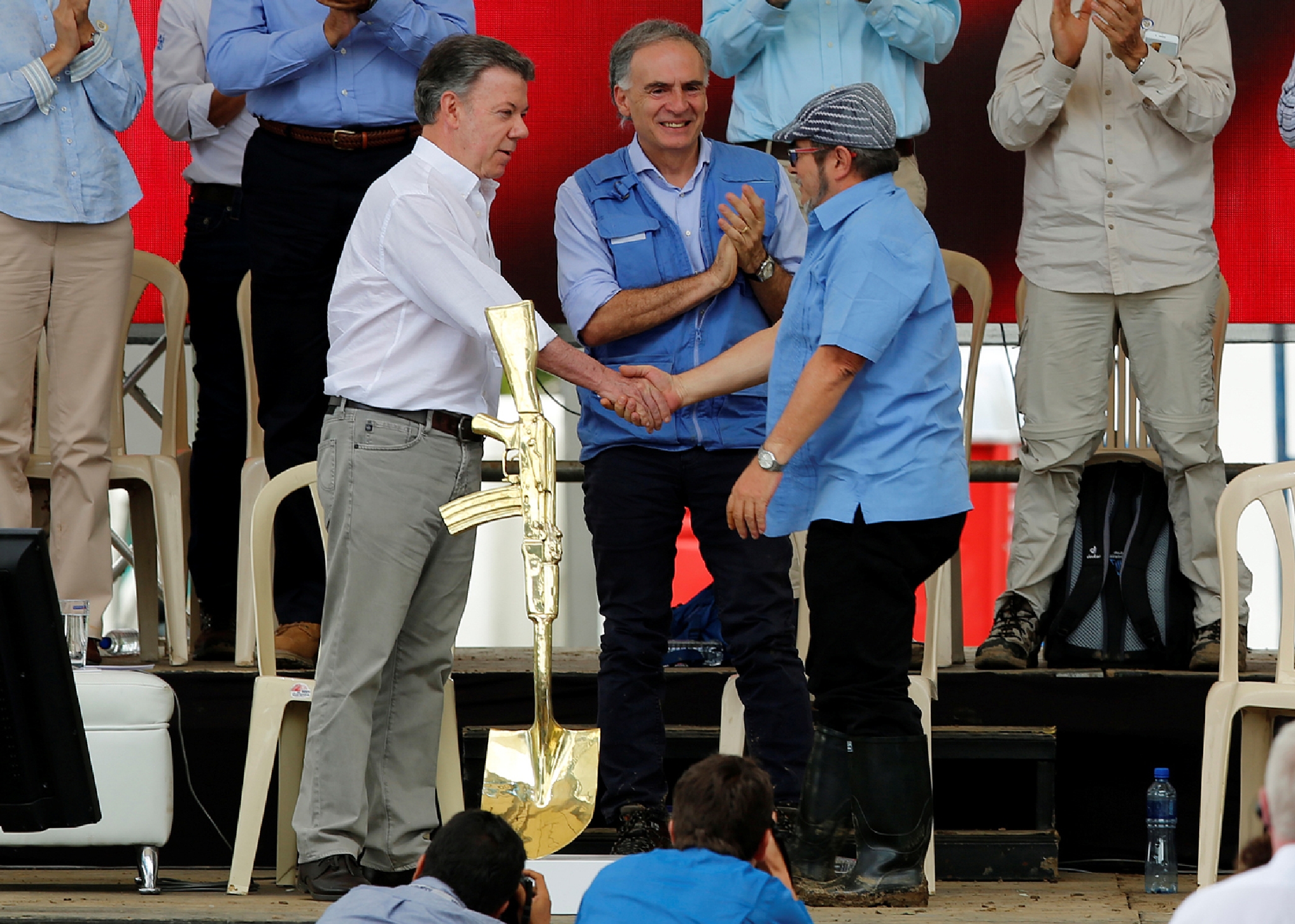
Eventually, on November 30, Colombia’s congress approved a revised peace accord. That outcome, however, was not the end of the story for Juanita León. The viral dissemination of falsehoods that had marred public debate was what was on her mind – and it convinced her that the kind of journalism she and her team were doing was not enough.
A Lie-Detector Born
“Despite the large amount of in-depth coverage we were providing, we couldn’t compete,” said León, the founder and director of La Silla Vacía, an online news site dedicated to investigative reporting on domestic politics. “We weren’t being successful at competing with post-truth or at reducing polarization… The misinformation being shared on WhatsApp was too powerful.”
Singling out WhatsApp was not gratuitous. The Facebook-owned instant messaging app for smartphones may not be extremely popular in the United States, but in many parts of the world, including Africa, Latin America, and parts of Europe, it is an essential part of daily life. Colombians use WhatsApp to communicate with family and friends, but also as a tool for work. It is so critical to communications, in fact, that when the service goes down, it makes the national news. According to the Colombian Ministry of Information and Communication Technology, 87 percent of people who have access to internet in the country use WhatsApp, making it the nation’s second-most popular social platform, just behind Facebook.
As such, in the lead-up to the vote, WhatsApp was an obvious medium for campaigning – and not only because of its popularity; images, videos, and audio recordings, alike, are quick and easy to share in the app, and many users are members of WhatsApp chat groups, through which content can be rapidly and widely distributed among friends, family members, coworkers, or classmates. It is also possible to send messages to all contacts with just a few taps, and then so on and so on, with the original source of the content quickly lost as it goes viral.
If the news media was not able to deal with the misinformation being spread by social networks, why not try to piggy-back onto the medium itself and start to fight fake news right there?
Ahead of the vote, viral WhatsApp messages included audio recordings of some seemingly trustworthy voice that warned of the dangers of voting “yes” or “no.” Other times, it was memes that portrayed castrochavismo or “gender ideology” claims or the alleged hypocrisy of the adversary camp. Then there were text messages signed by “someone in the know,” who was supposedly privy to truths being concealed from ordinary citizens.
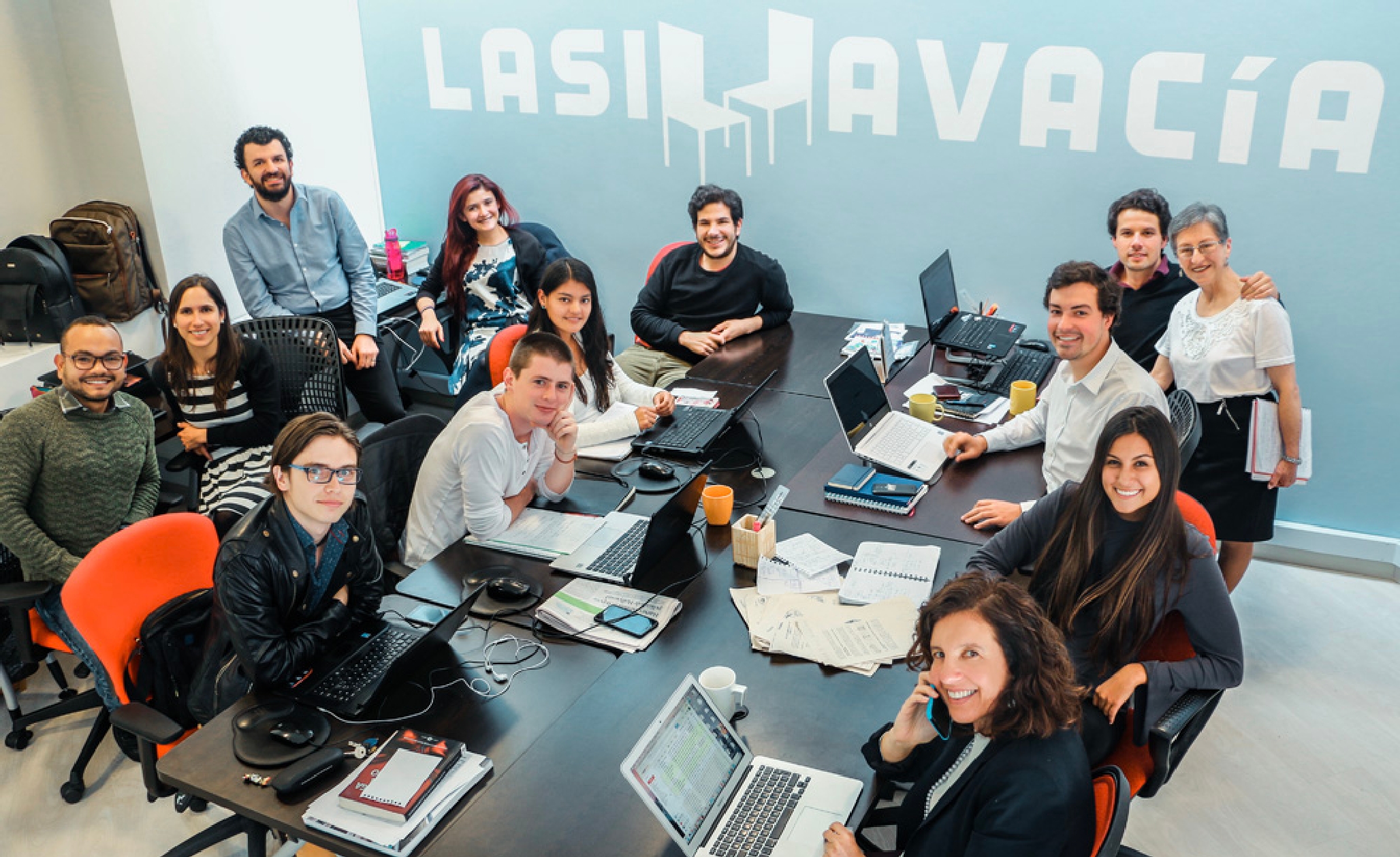
Juanita Vélez, one of La Silla Vacía’s reporters, came up with a creative idea: if the news media was not able to deal with the misinformation being spread by social networks, why not try to piggy-back onto the medium itself and start to fight fake news right there, within WhatsApp? In January 2017, La Silla Vacía’s WhatsApp “lie-detector” was born.
Share and Share Alike
As WhatsApp accounts are connected to mobile numbers, La Silla Vacía opened a line for users to send questionable messages to be checked. They asked their readers to send a screenshot as well, in order to prove that the message in question was viral, or at least seen by a group of people, and not just something that one friend had sent to another. The outlet then pledged to fact-check one message per week from among those that met its requirements: the message has to be about the topics that La Silla Vacía covers (“power and the powerful in Colombia”); it has to be relevant to the broader public; and it has to contain verifiable facts, not just opinions or theories. Perhaps most importantly, the reader who sends the message has to commit to share the resulting fact-check with friends.
Natalia Arbeláez, the La Silla Vacía reporter now in charge of the detector, goes through about 40 fact-check petitions on the WhatsApp line every week. She is sometimes assisted by the other 13 journalists working for the outlet. Arbeláez selects one or two to check, assessing their claims as true, false, something in between, or something that is difficult to prove. Then, she publishes the results on La Silla Vacía’s website and shares the link, via WhatsApp, with the person who requested the fact-check. A log of all fact-checked submissions is also available on La Silla Vacía’s website.
The outlet has also tried to innovate in terms of format. Arbeláez sometimes creates 30-second summaries of particular fact-checks in the form of a voice note, one of the most popular features of WhatsApp, and shares them in the hope that they will go as viral as the original message. La Silla Vacía’s television show, aired on a local channel in the capital, now features a segment devoted to common myths. The reporters have also created online quizzes on fact-checked subjects.
Some 57 percent of La Silla Vacía’s current budget comes from grants, including from the Ford Foundation, the Open Society Foundations, and the National Endowment for Democracy. Crowdfunding, ad sales, and special subscriptions to universities provide the rest. While the outlet’s reliance on grants has generated the occasional claim of “leftist” bias, it generally enjoys an untarnished public image. In late 2017, it became a verified signatory of The Poynter Institute’s international fact-checking code.
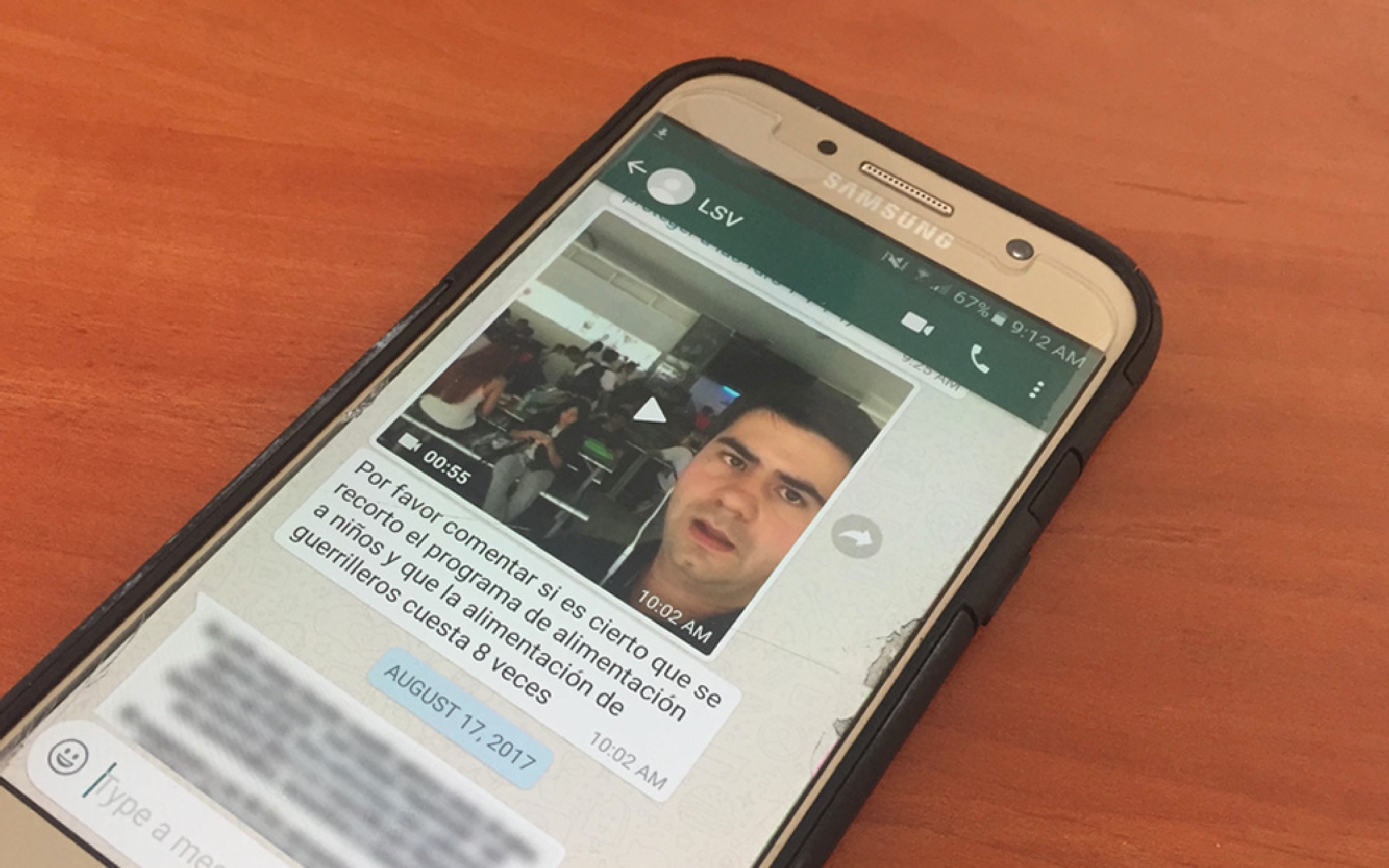
Arbeláez admits that in the course of executing the fact-checks, she is at times embarrassed to ask sources what seem to be obvious questions, but says she is committed to rigorously reporting every detail. “Besides,” she says, “I realized that things that might be obvious for us journalists are not so evident for the people who are asking us to check these things.”
Viral Veracity
Not all assignments, however, are free from complications. The most popular WhatsApp fact-check that Arbeláez has done was a viral message claiming that a French woman who died in a 2017 explosion in a Bogotá mall was a member of FARC. Arbeláez confirmed that the photos attached to the message were of a famous Dutch FARC combatant, and not of the French woman. She could not determine, though, whether the French woman was a FARC member, as there were no leads. And, although the police investigation dismissed that possibility, many still share messages linking the woman to the left-wing group. The lack of transparency in many public institutions, and Colombians’ lack of trust in them, made the exercise all the more difficult.
Nevertheless, the fact-check has been viewed more than 80,000 times on La Silla Vacía’s website. Still, it is impossible to know how much this, or any other WhatsApp check, has actually circulated on the platform. Anyone can share the messages they receive on the app, but the original creators won’t be notified when their content spreads. There is no view tally and, unlike in email programs, there is no trail of who has forwarded the messages.
León knows this is not ideal: “It is very hard to know how viral or effective our lie-detectors have been, but we trust our users to share them with their friends, as they agree to do. I have seen, just from how people talk about viral messages now, that their credibility has drastically dropped,” she says.
There are other anecdotal signs of impact. La Silla Vacía has published 28 WhatsApp fact-checks to date, some of which have made it into the national debate, as when Senator Claudia López tweeted one regarding a claim that her political career had been financed by FARC.
Arbeláez agrees with her boss: “There are still a lot of viral messages being sent. I don’t think we have discouraged their creation, but at least we know that some people are starting to doubt their veracity.”
In 2018, Colombians will elect a new Congress and a new president. Arbeláez expects WhatsApp, and the detector, to be rather busy.
* * *
Pablo Medina Uribe (@derpoltergeist) is a writer and translator based in Bogotá. He reports on politics, sports, culture, and their intersections and has published in outlets in Colombia, the United States, and Europe. He worked at La Silla Vacía as an intern in 2010 and as a reporter from 2011 to 2012.
Cover photo courtesy of La Silla Vacía
